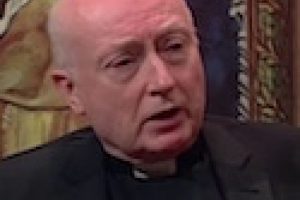Column: From the Pastor
A chronic temptation of the historian is to play the “Monday morning quarterback” who assumes that he would have made a correct decision in a past crisis. But the players at the time could only postulate consequences. The appeasers who signed the Munich Agreement in 1938 do not enjoy a happy legacy, but then the thought of repeating the carnage of the Great War was unspeakable. In his first use of the term, back in 1911, Churchill described “une politique d’apaisement” as a wise strategy.
A magnanimous Churchill wept at the coffin of Neville Chamberlain and eulogized: “The only guide to a man is his conscience; the only shield to his memory is the rectitude and sincerity of his actions.” But if blundering by innocence is forgivable, not learning from mistakes is unconscionable. That distinguishes innocence from naiveté. Experience has crafted the adage: “Fool me once, shame on you; fool me twice, shame on me.”
Some future historian may impute a lack of probity to the Vatican agreement with Beijing in 2018, which conceded civil interference in the appointment of bishops. Though difficult to assess since the full text has not been published, this clearly contravenes the canonical stricture that “In the future, no rights and privileges of election, nomination, presentation, or designation of bishops are granted to civil authorities.” (Code of Canon Law c. 377.5)
After Pope Pius XI realized that the Reichskonkordat of 1933 had been abused by Nazi Germany, he issued the encyclical Mit brennender Sorge—“with burning indignation.” Damage had been done, just as the Yalta Agreement of 1945 put Poland on the chopping block, a betrayal never forgotten by a Polish pope (Centesimus Annus, n. 24). He denounced the fallacy of communism in Warsaw in 1979, and Reagan did the same in his Westminster speech in 1982. The New York Times displayed its propensity to be fooled more than twice, by editorializing that John Paul II “does not threaten the political order of the nation or of Eastern Europe” and that Reagan was “bordering on delusional.”
While the Holy See invokes two thousand years of diplomatic experience, China beats that by more than twice, and has treated the 2018 agreement as tissue, tearing down churches and persecuting faithful Catholics, not to mention banishing over a million Uighur Muslims and Falun Gong cultists to concentration camps. The issue is not theology but control. The Vatican Secretary of State said that “an act of faith is needed” for the agreement to work, but the heroic Cardinal Zen replied that a “miracle” is needed, and miracles are rare in Rome and Beijing.
Diplomacy is a delicate art, and there have been saints among Catholic emissaries, though few remember Eusebius of Murano, Conrad of Ascoli, Anastasius Apocrisarius, and Fulrad of Saint Denis. There remains the haunting specter of the only diplomat among the Twelve Apostles, “who by transgression fell, that he might go to his own place” (Acts 1:25).
———————
Fr. George W. Rutler, S.T.D., is a brilliant scholar, author, convert, former pastor of Our Saviour in Midtown Manhattan, the closest Catholic parish near the site of 9-11, and now pastor of St Michael’s parish in Hell’s Kitchen, New York City. A donation of any amount may be made to the parish at: www.StMichaelNYC.com.
View Articles Father Rutler was ordained to the diaconate in Rome by His Eminence William Cardinal Baum in 1980 and received priestly ordination in St. Patrick's... MORE »



You must be logged in to post a comment.